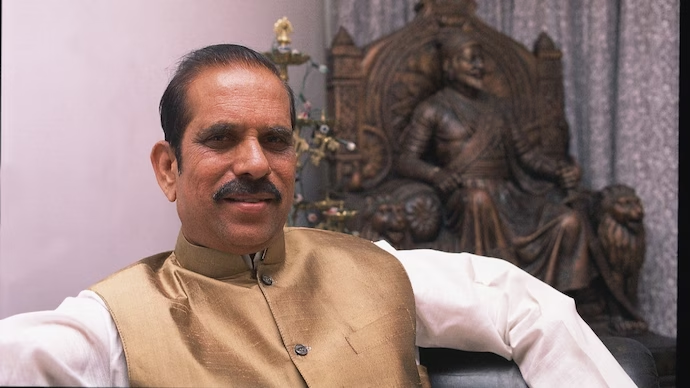Former Maharashtra Chief Minister and Shiv Sena stalwart Manohar Joshi died at a hospital in Mumbai today. He was 86.
He was admitted to Hinduja Hospital on February 21, after suffering a cardiac attack and was being treated in the intensive care unit. He died at 3.02 am today.
Manohar Joshi served as the Chief Minister of Maharashtra from 1995 to 1999 under the Shiv Sena-BJP coalition. He was the Speaker of the Lok Sabha from 2002 to 2004. The senior Shiv Sena leader began his career as a teacher and thus he was called 'Sir'.
Joshi had entered politics in 1967. His becoming Lok Sabha Speaker was a sheer accident and a matter of luck as the then Speaker GMC Balayogi had died of a chopper crash. The choice of Joshi as Speaker during the Vajpayee government worked out as Late Pramod Mahajan had given a push to the proposal.
Shiv Sena chief Bala Saheb Thackerary used to often say, "He is Speaker...but he cannot speak (without Sena chief's permission)".
Sir Joshi as Speaker also allowed Sonia Gandhi to read out her speech during debate in the House. In 2004 parliamentary polls, Joshi surprisingly lost to a political heavy weight from his stronghold Mumbai North Central Lok Sabha constituency Eknath Gaikwad.
"Believe me, in India we know when democracies work we re-elect governments," - Dr Jaishankar on Modi 3.0
At the India Europe Business and Sustainability Conclave, External Affairs Minister Dr S Jaishankar garnered applause as he talked about how democracy works in India.
"I would like to end in reference to what my Estonian colleague (foreign minister) said on democracy, .....He said that democracies work that is why we change governments. Believe me, in this country we know when democracies work we re-elect governments.”
Europe's importance to India:
PM Narendra Modi during his tenure since 2014 has been 27 times in Europe and he has received European heads of nations and governments 37 times.
"I have visited Europe 29 times," - Dr Jaishankar (since 2019) and "...I have received 36 my colleagues during this period".
He also stated: "But it is not just a relationship with a continent or even a union. We also have made an effort to engage European countries in smaller groupings, and the presence of my colleagues from the Baltics is a reminder that we will be holding a Nordic-Baltic meeting in the coming days.
And I hope, as I discussed with my colleague with Greece, that perhaps one day soon we would hold a similar gathering with countries of the Mediterranean.
"Now if I could really, as Indians and Europeans gather in this room and others who wish us well, address myself to what is it that drives the world economy, because that is really why we have assembled here today.
And all of you would agree that there are six broad elements of that. One of course is the production and consumption. The second is connectivity and logistics. The third is technology. The fourth, increasingly realized today, is of demographics. The fifth is of values and comforts, because countries and societies who bond with each other more closely obviously find it much more easy to do business as well.
And finally, to the extent we create an architecture, a framework, it is much easier for us to do business and promote economic partnerships. So today, some of the thoughts I present before you are from those perspectives of business, of sustainability, of creating partnerships."
"I must also share with our European friends that within South Asia, in this region, South Asia and beyond, there are again very big connectivity projects already under execution and still bolder thoughts in the making.
Between India and its immediate neighbors, Bangladesh, Nepal, Bhutan, we have seen actually in terms of roads, grid connections, waterways, a very big change which has come about.
There is a much more arduous project, the trilateral highway, and in fact if the IMEC connects India to Europe through the west and the trilateral highway when it is done, and we have challenges in Myanmar there, but when the trilateral highway is done, it would go all the way to the Vietnamese coast.
So you actually will have a lateral connectivity grid which would connect Europe all the way to the Pacific, mostly by land. So this is surely a thought for your consideration. Now on connectivity, I think we would particularly value working with Europe because it is important today that connectivity is collaborative,
......
it is transparent, it is based on viable projects, it doesn't have hidden agendas, and by doing that, we will set before the world a model of how international cooperation on connectivity should work, and we hope that other countries will draw appropriate lessons from that model.







No comments:
Post a Comment